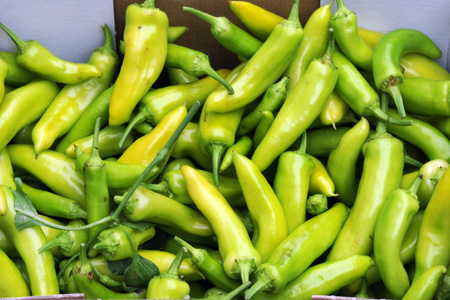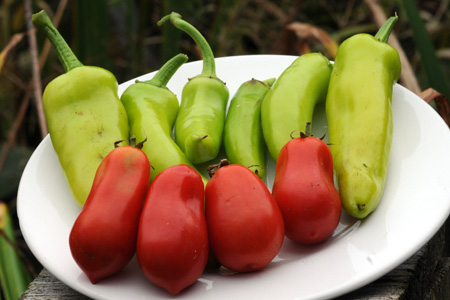Welcome to Relaxed Farming
- Alpacas
- Chickens
- Dairy Goats
- Ducks
- Geese
- Pigs
- Pygmy Goats
- Quail
- Rabbits
- Sheep
- Turkeys
- Polytunnel
- Photo Stories
- Video Stories
- Food
- Smallholding Map
- 2013
- 2014


- August
- September
- October
- November
- December
- January
- February
- March
- April
- May
- June
- July
- August


- 1
- 2
- 3
- 4
- 5
- 6
- 7
- 8
- 9
- 10
- 11
- 12
- 13
- 14
- 15
- 16
- 17
- 18
- 19
- 20
- 21
- 22
- 23
- 24
- 25
- 26
- 27
- 28
- 29
- 30
- 31
Sunday, 12th October 2014
So how much does it cost to produce one pepper (or one onion, or tomato or any one vegetable or fruit)? Is it easy to work out? For commercial growers it surely has to be, because they have to work out how much it costs to grow their fruit and vegetables, in order to then work out how much to charge the customer! It is actually very complicated and there are many factors to consider.
As you know, our crop of peppers has been fantastic this year. The Hungarian Wax Pepper seeds we bought cost £1.80 for a pack of 25: we planted 20 of these and managed to successfully grow 10 plants. We have now harvested most of the fruit from these plants and from each plant picked an average of 100 peppers, approximately 1 kilo in weight (this includes the ones we picked on a daily basis as the plants grew).
If you now do the maths (and if you are really good you will do it now BEFORE you reach the end of this sentence) you will have worked out that based on the seed costs alone, one pepper costs an amazing 0.18p or 18p per kilo of peppers!!! Current supermarket prices for 'similar' peppers are around £9 to £10 per kilo!!!! Whoa!!
BUT, as said at the start, it is NOT that simple: we have not taken into account ANY of the following: the cost of the water used to water the plants; the cost of using 'our' compost; any costs from building our polytunnel; any of the hours we spent planting, weeding, watering, picking the fruit; the cost of any slug pellets (or similar) we had to use... Some of these costs would be very hard to work out - the compost in particular.
But commercial growers do have to work it out and that is often where averages come in: so for example we could take the cost of the polytunnel and average it out between ALL the vegetables we have grown in the last five years!! That would be a mighty big sum (and be dependent on how accurate our records had been...)
Yes, like we said: it is VERY complicated so for now we (or David) will simply enjoy our bumper crop and leave the maths for another day!!!

